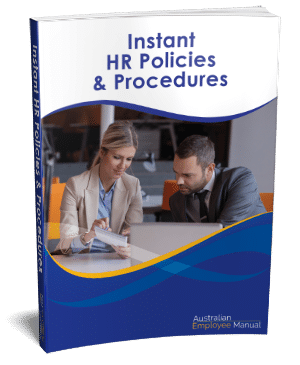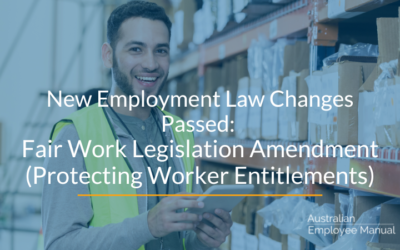We have discussed why Domestic Violence is a workplace issue in a previous blog post, and what small businesses need to do about it for their teams.
Summary of the new Family & Domestic Violence Leave provisions
The Full Bench decided to provide five days’ unpaid leave per annum to all employees (including casuals) experiencing family and domestic violence.
The new leave will be available in the event that an employee needs to do something to deal with the impact of the family and domestic violence and it is impractical for them to do that thing outside their ordinary hours of work.
The new provisions:
- will apply to all employees (including casuals);
- will be available in full at the commencement of each 12-month period rather than accruing progressively during a year of service;
- will not accumulate from year to year; and
- will be available in full to part-time and casual employees (i.e. not pro-rated).
Employees will not be required to have used up their paid leave entitlements before accessing this new entitlement.
In addition, employees who access domestic violence leave will be protected from any form of adverse action as a result of accessing the leave. This means businesses need to ensure their processes are clear, well-considered and compliant with requirements.
One thing to note, the provisions will not apply to employees covered under the Australian Government Industry Award 2016, the Road Transport and Distribution Award 2010 and the Road Transport (Long Distance Operations) Award 2010, which are the subject of a separate case.
Draft Award Clauses
Below we have included the full draft wording of the relevant family and domestic violence leave clauses that will be included in Modern Awards. This wording is out for consultation from all interested parties, with a hearing set down for 21 June 2018.
What generally happens is that we can expect to see some minor changes made to the final wording after the consultation process. However, these draft clauses give a clear indication of the direction the Fair Work Commission is headed.
Leave to deal with Family and Domestic Violence: Model Term
X.1 This clause applies to all full time, part-time and casual employees.
X.2 Definitions
(a) In this clause:
family and domestic violence means violent, threatening or other abusive behaviour by a family member of an employee that seeks to coerce or control the employee and that causes them harm or to be fearful.
family member means:
(a) a spouse, de facto partner, child, parent, grandparent, grandchild or sibling of the employee; or
(b) a child, parent, grandparent, grandchild or sibling of a spouse or de facto partner of the employee; or
(c) a person related to the employee according to Aboriginal or Torres Strait Islander kinship rules.
(b) A reference to a spouse or de facto partner in the definition of family member in clause X.2(a) includes a former spouse or de facto partner.
X.3 Entitlement to unpaid leave
(a) Each year, an employee is entitled to 5 days’ unpaid leave to deal with family and domestic violence.
(b) The entitlement to 5 days’ unpaid leave to deal with family and domestic violence:
(i) is available in full at the start of each 12-month period of the employee’s employment; and
(ii) does not accumulate from year to year.
Note:
- A period of leave to deal with family and domestic violence may be less than a day by agreement between the employee and the employer.
- The employer and employee may agree that the employee may take more than 5 days’ unpaid leave to deal with family and domestic violence.
X.4 Taking unpaid leave
An employee may take unpaid leave to deal with family and domestic violence if the employee:
(a) is experiencing family and domestic violence; and
(b) needs to do something to deal with the impact of the family and domestic violence and it is impractical for the employee to do that thing outside their ordinary hours of work.
Note: The reasons for which an employee may take leave include making arrangements for their safety or the safety of a family member (including relocation), attending urgent court hearings, or accessing police services.
X.5 Service and continuity
The time an employee is on unpaid leave to deal with family and domestic violence does not count as service but does not break the employee’s continuity of service.
X.6 Notice and evidence requirements
(a) Notice
An employee must give their employer notice of the taking of leave by the employee under clause X.
(b) The notice:
(i) must be given to the employer as soon as practicable (which may be a time after the leave has started); and
(ii) must advise the employer of the period, or expected period, of the leave.
(c) Evidence
An employee who has given their employer notice of the taking of leave under clause X must, if required by the employer, give the employer evidence that would satisfy a reasonable person that the leave is taken for the purpose specified in clause X.4.
Note: Depending on the circumstances such evidence may include a document issued by the police service, a court or a family violence support service, or a statutory declaration.
X.7 Confidentiality
(a) Employers must take steps to ensure information concerning any notice an employee has given, or evidence an employee has provided under clause X.6 is treated confidentially, as far as it is reasonably practicable to do so.
(b) Nothing in clause X prevents an employer from disclosing information provided by an employee if the disclosure is required by an Australian law or is necessary to protect the life, health or safety of the employee or another person.
Note: Information concerning an employee’s experience of family and domestic violence is sensitive and if mishandled can have adverse consequences for the employee. Employers should consult with such employees regarding the handling of this information.
X.8 Compliance
An employee is not entitled to take leave under clause X unless the employee complies with clause X.
What you need to do now
Family and Domestic Violence leave is on its way. All businesses need to consider how they will be implementing these new provisions in their workplaces, and should be discussing the operationalisation of the new provisions with their team.
Now is also the time to start drafting a Domestic and Family Violence Policy for your team if you don’t already have one in place.
People who have purchased our HR Manual know that we already have a Domestic Violence Policy included in the manual. We will be updating the provisions in our policy manual once the final wording is handed down from the Full Bench of the Fair Work Commission.




